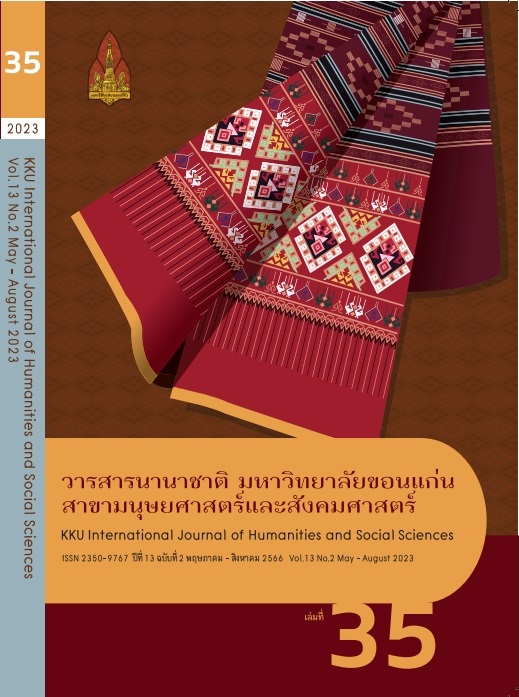ผลกระทบและการปรับตัวของประชาชนในสถานการณ์การแพร่ระบาดของโรคโควิด-19 สู่การปรับตัวของชุมชนวิถีใหม่ จังหวัดนครราชสีมา
Main Article Content
บทคัดย่อ
บทความวิจัยนี้ มีวัตถุประสงค์เพื่อศึกษาผลกระทบและการปรับตัวของประชาชน ในสถานการณ์การแพร่ระบาดของโรคโควิด-19 สู่การปรับตัวของชุมชนวิถีใหม่ในมิติเศรษฐกิจ สุขภาพ สังคมและสิ่งแวดล้อม เทคโนโลยีสารสนเทศ และด้านการศึกษาในจังหวัดนครราชสีมา ใช้วิธีการวิจัยเชิงปริมาณและเชิงคุณภาพหรือแบบผสมผสาน มีการกำหนดตัวอย่างในการ วิจัยจำนวน 410 ครัวเรือน โดยใช้วิธีการสุ่มตัวอย่างการสุ่มตัวอย่างแบบหลายขั้นตอน ซึ่งเป็นการศึกษาด้วยแบบสอบถาม และกลุ่มเป้าหมายผู้ให้ข้อมูลที่สำคัญที่เกี่ยวข้องจำนวน 18 คน ด้วยเครื่องมือการวิจัยคือ แบบสัมภาษณ์เชิงลึก และมีการวิเคราะห์ข้อมูลเชิงปริมาณ ของกลุ่มตัวอย่าง วิเคราะห์ด้วยการคำนวณหาค่าแจกแจงข้อมูล ค่าร้อยละและ การวิเคราะห์ข้อมูลเชิงคุณภาพ ใช้หลักการวิเคราะห์เชิงอุปนัย โดยข้อค้นพบจากงานวิจัย ชิ้นนี้สามารถนำไปใช้ประโยชน์โดยองค์กรภาครัฐ ตลอดจนองค์กรปกครองส่วนท้องถิ่น สามารถนำไปใช้กำหนดนโยบายสาธารณะ แนวทางการปฏิบัติตลอดจนประชาชนได้รับรู้ แนวทางที่เหมาะสม ทราบถึงผลกระทบและลักษณะการปรับตัวของชุมชนวิถีใหม่ ผลการศึกษา พบว่า 1) กลุ่มเกษตรกรในพื้นที่ได้รับผลกระทบจากสินค้าทาง การเกษตรที่ไม่สามารถขายได้ เกิดการชะลอตัวในการจับจ่ายสินค้าของประชาชน การเกิด ความวิตกกังวล การเดินทางออกนอกบ้าน ความสัมพันธ์ของคนในชุมชนค่อนข้างห่างขึ้น มีการหวาดระแวงกันระหว่างชุมชน ข้อมูลข่าวสารระดับจังหวัดผ่านสื่อสังคมออนไลน์ ค่อนข้างล่าช้า และรูปแบบการเรียนออนไลน์ของเด็กเล็ก ซี่งผู้ปกครองต้องคอยดูแล ช่วงระหว่างเรียนออนไลน์ ทำให้ผู้ปกครองต้องมีความรับผิดชอบเพิ่มมากขึ้น 2) ประชาชน มีการวางแผนในการใช้จ่ายในระดับครัวเรือน มีความระมัดระวังในการใช้จ่ายมากขึ้น การทำอาหารทานเองในครัวเรือน และทำให้เกิดกลุ่มอาชีพใหม่ๆ ในพื้นที่ มีการป้องกัน ตัวเองเมื่อออกนอกบ้าน ตลอดจนการงดงานสังสรรค์ และงานที่ต้องรวมตัวกันกับคน จำนวนมาก ๆ อีกทั้งมีการทำงานอยู่กับบ้านเพื่อการระวังตัวเอง
Article Details
เอกสารอ้างอิง
กฤษฎา บุญชัย และคณะ. (2563). การประเมินความเสียหาย ผลกระทบและการปรับตัวของชุมชนท้องถิ่นต่อภาวะโรคระบาด COVID-19. กรุงเทพฯ: สถาบันชุมชน
พัฒนาท้องถิ่น.
กระทรวงสาธารณะสุข. (2563). สถานการณ์ โรคติดเชื้อไวรัสโคโรน่า 2019 Coronavirus Disease 2019 (COVID-19). สืบค้นเมื่อ 5 พฤศจิกายน 2563 จากเว็บไซต์ https://media.thaigov.go.th.
จำเนียร จวงตระกูล และคณะ. (2563). การวิจัยแบบผสม: การนำการออกแบบการวิจัยแบบผสมเจ็ดรูปแบบสู่การปฏิบัติ. วารสารชุมชนวิจัย มหาวิทยาลัยราชภัฏ
นครราชสีมา. 14 (1).
ทนงศักดิ์ แสงสว่างวัฒนะ และคณะ. (2563). "New Normal" วิถีชีวิตใหม่และการปรับตัวของคนไทยหลังโควิด-19 : การงาน การเรียน และธุรกิจ. วารสารการบริหารการปกครองและนวัตกรรมท้องถิ่น. 4 (3)
ธานี ชัยวัฒน์ และคณะ. (2563). รายงานการวิจัยเรื่อง เศรษฐศาสตร์พฤติกรรมว่าด้วยเส้นทางชีวิตและกิจกรรมร่วมของครัวเรือนไทยภายใต้สถานการณ์ COVID-19.กรุงเทพฯ: คณะเศรษฐศาสตร์ จุฬาลงกรณ์มหาวิทยาลัย.
บุญเรือน ทองทิพย์. (2563). โรคติดเชื้อไวรัสโคโรนา 2019 (COVID-19) กับศักยภาพของผู้นำต่อการพัฒนา องค์การแบบ New Normal.วารสารสังคมศาสตร์และมานุษยวิทยาเชิงพุทธ. 5 (11). 434-447.
ปิยะวัติ บุญ-หลง และคณะ. (2559). งานวิชาการเพื่อสังคม: หลักการและวิธีการ. กรุงเทพฯ:สถาบันคลังสมองของชาติ.
พีรพัฒน์ ใจแก้วมา. (2563). การศึกษาพฤติกรรมการดำรงชีวิตแบบปรกติใหม่ของประชาชนชาวไทยระหว่างวิกฤตโควิด-19 ที่ปรากฏในสื่อออนไลน์. (วิทยานิพนธ์ปริญญาบัณฑิต. มหาวิทยาลัยนเรศวร, คณะเกษตรศาสตร์ทรัพยากรธรรมชาติและสิ่งแวดล้อม).
มติชนออนไลน์. (2563). สถานการณ์โรคระบาดโควิด – 19 ของจังหวัดนครราชสีมา. สืบค้นเมื่อ 5 พฤศจิกายน 2563, จากเว็บไซต์ https://www.matichon.co.th
ยงยุทธ วงศ์ภิรมย์ศานติ์. (2563). การดำเนินงานสุขภาพจิตภายใต้วิกฤตโควิด-19ของประเทศไทย. วารสารสุขภาพจิตแห่ง ประเทศไทย. 28(4).
สำนักงานสภาพัฒนาการเศรษฐกิจและสังคมแห่งชาติ. (2563). รายงานภาวะสังคมไทยไตรมาสสอง ปี 2563. สืบค้นเมื่อ 7 พฤศจิกายน 2563, จากเว็บไซต์ http://www.bict.moe.go.th/2020/images/G_Data/file/6311/631126-1/2.1.pdf.
อวาทิพย์ แว. (2563). COVID-19 กับการเรียนรู้สู่การปรับเปลี่ยนพฤติกรรมสุขภาพในวันนี้. วารสารสมาคมวิชาชีพสุขศึกษา. 35(1)


